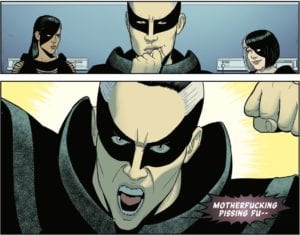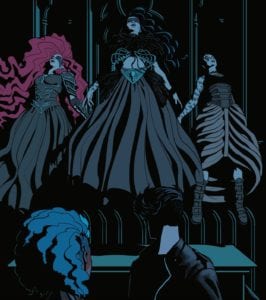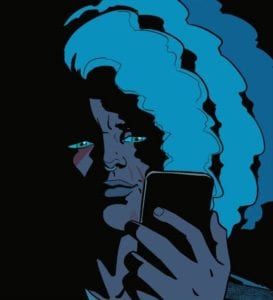As we run out of issues to review, the big picture in WicDiv starts becoming clearer. It usually works that way with stories that work on basis of enigma. This tends to be rather bittersweet, and that’s just when the writers do it competently. So far, addressing Kieron Gillen’s writing as merely ‘competent’ is an understatement that could earn you a slap and a curse on your family. (Yeah, I introduced my beloved, though slightly wacky ex, into WicDiv — with lovely results). The only thing that could ruin the flow would be an ass-pull.
Here’s hoping…
Anyway, this week we shall see the truth revealing a wee bit brighter to our enthralled, divinely besotted eyes. Will we see blood? Wil we see tears? Both, maybe? Spoilers ahead, loves.
Issue #38
“Of course they can’t resist it.”
We begin today with a little audience taking place in Devonshite, England in 1944, between poet Robert Graves and a lovely Miss Anna White – the same woman featured in this issue’s cover. Following a generous helping of whiskey, Anna White goes into detail about the Gods, especifically those famous foundational three, the Maiden, the Mother, and the Crone. The writing to her lines is quite peculiar. Her words to Mr. Graves are fairly clear and revealing, but to us knowledgeable readers, they’re rather ambiguous and even kind of misleading. She identifies herself as the giver of godhood and inspirer of iconography, but she vaguely distances herself from too direct a role by speaking of the three women as her Sister’s Gods.
By her admitted aversion to the dark and our experience, we know that Anna White is Ananke. (I mean, the name and facial structure are kind of a giveaway) Or rather, Minerva on her way to becoming Ananke. Regardless, who we see here is essentially our Ananke when younger. It’s sometimes difficult or even off-putting to see our loathed villains exhibit a lighter facet to their characters. But I do quite enjoy whiskey-drinking Ananke, and I’d like to see more of her, please.

Anyway, this is the ‘fateful’ night that would inspire Robert Graves’ essay The White Goddess, published four years later. The event was referenced in an early issue. Several years later, during a colloquium in 1957, Robert Graves speaks of The White Goddess, falsely attributing his ‘enlightenment’ to a spontaneous obsession while also downplaying Ananke’s role, landing her in a mere, ethereal role of muse. Naturally, Anna White, who attended the event is not pleased about his betrayal for the sake of academic cred. She may be the baddie here, but I sympathise. Forgot that.
Fast forward to 2013. A child appears amidst a field of flowers in England. She resembles the same child who ‘lived’ through ninety years of darkness after a botched ritual back in Egypt, as seen in the previous issue. This appears to be our Minerva, who is well in collusion with Ananke even before her flashy ‘ascension’, after which she was adopted by her parents, and we just about know the rest on that. We also get a look into some behind-the-scenes scheming to tie loose ends. Therefore, we could never trust Minerva, not even from the beginning. Minnie and Annie, they were pulling the strings all along the way.
Another fast forward to the present day, we get another unpleasant alliance between the other baddies to the story. Woden meets up with Cass’s old crew, a bunch of nobodies whose names I already forgot, who use the magic of editing to further discredit Urdr. That’s right, there was tampering to paint her Cassandran Truths. Woden, joined by Minerva, go have a chat with the imprisoned Norns. Minerva plays the scared bargaining chip role to encourage Urdr’s cooperation. Woden requires her to divine the location of the remaining Gods. Loud swearing ensues — isn’t Cass just the best?

A bit later, Woden and Minerva “find” the Heads. Luci, Inanna, and Tara, still alive, with carvings on their faces and sewn lips. There’s also Sakhmet’s dead head. Creepy shit, that is, but Minerva’s evil grin takes the prize on that scale. Her expression hints that she wants Woden to try and touch any of that “gunk stuff”. Doing so would probably help her agenda… but are we not curious to see what indeed would happen? And if we wanted a suitable guinea pig for it, who better than asshole spurious God Woden?
Down in Highbury and Islington, Baphomet — who now decides to go by his original name, Nergal — mourns over The Morrigan’s body. Persephone urges Nergal to carry her body along if he must; they have to get moving further into the Underground. Despite the bitter, abusive tone of their relationship, Nergal’s grief strikes true. Even his motions seem to run on pure automatic response, as noted by Persephone’s inner monologue. Eventually, they reach depths Persy has never seen before: the humble abode of Nergal and The Morrigan. Well, if an underground cathedral can be called ‘humble’.

To their surprise, Marian’s body starts levitating, Next to her, we see her personae of Babd and Gentle Annie. Something is about to occur, and Nergal advises Persephone to leave, for her own sake. Before she complies, though, she reveals to him that she’s pregnant. Nergal’s response is committing enough. Whether as friend or as other half to this circumstance, he will do all he can. But at this moment, his decision takes priority: he will finish this temple to his dead girlfriend…whatever that actually means. Laura’s inner monologue, and her emotional response by extension, is vague.
Later, Minerva visits Baal in the burned ruins of Valhalla. The latter summoned a load of rain to put out the fire. It’s a dreary scene, much like the overall landscape of events. Judging by their dialogue, Baal thinks Minerva is innocent. Well, he was away for plenty of the events to this arc. In this obliviousness, he confesses that he could not bring himself to kill Laura, and that she’s pregnant. Now, this second thing is absolute news to Minerva. And judging by her freaked out expression (priceless), this is a big NO NO.
Back in the Underground, Persephone has a lonesome moment of reflection. She thinks on the things that have happened, all originated from their foolish desire to become Gods, despite knowing they were doomed. It’s a painful reflection, tragic even, since they chose to hold on to this poisoned chalice. And her expressions throughout flawlessly reflect her heartache. Laura’s cellphone is done for, so she wanders around the dark, arriving at her and Sakhmet’s old abode, where she finds a still functioning phone.

She sends Cass a text. It’s a well-wishing as well as a warning about Baal and Woden, the latter of whom reads the text out loud to Cass, since she’s his prisoner. The sum of it all sounds like a farewell, really. Suddenly, an alarmed Minerva runs in, urging Urdr to divine where Persephone is. At first, Urdr refuses to help Woden find Persephone. She won’t do it, not even when Woden puts a gun to her head – turn the gun to the other Norns, though… and Cass complies. The three Norns work their magic to look for Persephone, but despite their efforts, all they see is Persephone gone.
It’s not that she’s in the Underground and reception is rubbish down there. No. Persephone does not exist.

